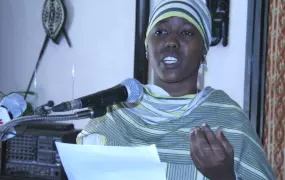FGM is a practice that violates the basic human rights of women and girls and seriously compromises their health. Nevertheless, among communities that practise FGM it is a highly valued tradition, making eradication difficult.
Nevertheless, there are also success stories. As individuals become better informed about the negative impacts of FGM, there has been a reduction in the practice and today there are few communities in which 100 percent of girls and women are circumcised.
Local organisations are working to eradicate the custom in many communities, and are achieving a higher level of success because they are able to communicate more easily with the people, whereas foreigners may appear to be ignorantly judging their traditions.
Over the last two decades, many countries have designed legal frameworks that criminalise FGM and protect women and girls who challenge the status quo, forcing those who continue to advocate it to reconsider their posiWhen culture harms the girls - the globalisation of female genital mutilationtion and actions. In many cases, communities have fully or partially abandoned the practice in favour of non-FGM initiation ceremonies.








![Razor blades, knives or in some cases shards of glass are used to cut the genitals [Burkina Faso] FGM often takes place in unsterile surroundings and with rudimentary instruments, such as knives and glass. At least in some communities, the use of new razor blades is being increasingly used.](https://assets.thenewhumanitarian.org/s3fs-public/styles/media_list_1x/public/images/2005370.jpg.webp?itok=fTo2SJnN)



![Une jeune fille excisée sans anesthésie en 2005, un an avant les premières interventions chirurgicales de reconstruction clitoridienne au Burkina Faso (photo d’archives) [Burkina Faso] This girl undergoes excision without anesthesia, as do the 70 percent of women in Burkina Faso.](https://assets.thenewhumanitarian.org/s3fs-public/styles/media_list_1x/public/images/2005374.jpg.webp?itok=elrL0b6t)


![Twelve-year old girls from a Maasai community in Kenya. The traditional rite of FGM among the Maasai is performed between the ages of 12 and 14 [Kenya] Twelve-years old girls from a Masai Community in Kenya. The traditional rite of FGM among the Maasai is performed between the ages of 12 and 14.](https://assets.thenewhumanitarian.org/s3fs-public/styles/media_list_1x/public/images/20053717.jpg.webp?itok=v08wEU5w)

![The kind of blade commonly used to carry out FGM/C operations [Egypt] The blade used to carry out the FGM operation.](https://assets.thenewhumanitarian.org/s3fs-public/styles/media_list_1x/public/images/20057193.jpg.webp?itok=FuDZ5iS1)

